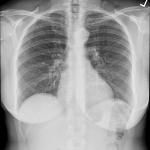In vascular realms where risks abide,
A rule we held, a trusty guide,
For every year with diabetes crowned,
A year to age, our wisdom found.
Yet, a study bold, a truth unfurled,
Challenges the norm.
mortality
Death seems like it would be a pretty discrete data point with little ambiguity. After all, you either are or are not dead. But as it does so often, the meaning of death in health research is more complex than that simple binary choice. A new study of death and dying in Denmark provides food for thought about how best to use that discrete endpoint to better understand the care we provide.
It's intuitive that a robust immune response to COVID-19 will result in a less severe, even asymptomatic infection. A new study puts some numbers to the term "robust."
Just as restaurants, fast-food or otherwise, are beginning to open up, a new study demonstrates an association between eating out and your mortality. I’ve had a few bad meals in my time, but can they be killing me?
As the drumbeats for health systems to treat the socioeconomic determinants of health grows louder -- and administrators eye an enlarging “mission” and the funds that come with it -- ask yourself this: What exactly are those determinants? A new study provides some tentative answers.
While coronavirus is obviously concerning and a very real threat to some people (namely, the elderly and immunocompromised), these data also show that the risk for the rest of the population is quite low.
A new study finds that your fate may not be written in the stars, but instead hidden in plain sight in a chest X-Ray. Can one image predict your mortality?
In 2017, the CDC recorded 2,813,503 deaths in the United States. That's an average of 7,708 per day. But averages can be misleading. While that's the average, there is wide variability depending on the time of year. Specifically, people are far likelier to die during one extreme temperature season than the other.
Is there a magical prescription for how much exercise and activity eliminates the increased risk of premature death, which comes from sedentary behavior? A new paper takes a swing at an elusive target. Spoiler alert: This is an area that continues to defy precision.
The systematic erosion of continuity of care has financial and personal health costs. This is well-known, especially to health professionals, and it's supported by overwhelming evidence. And yet, it persists.
Could it be that where we go to medical school makes us better, or worse, physicians? Or rather, is the old joke true? "Q: What do you call the student graduating at the bottom of their medical school class? A: Doctor."
It is officially July! In the medical world that means fresh graduates become interns or fellows or attendings. Along with such promotions comes high turnover departures and the refrain "don’t get sick in July." But, does this annual transition actually make patients more vulnerable to adverse events?











